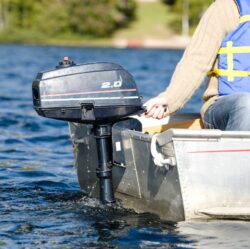Boats have been used to explore the world in the past but now they are typically used for recreation, fishing, and more. As time has passed boats have become more of a pastime for people who like such activities.
*This post may contain affiliate links. As an Amazon Associate we earn from qualifying purchases.
The boating arena has its own folk tales as well as traditions that have been passed down for many years but often people don’t know why they started. One of the important traditions still preserved today is the naming of the boat after a woman.
Boats are named after a woman’s name due to various reasons. One of the reasons behind this theory is that historically boats were named after Goddesses and important women and as the time went by they have started to be named after other important women in the boat owners life.
Another reason for having named most boats after female names is because of the European languages. In certain languages such as German and French, each object has a gender classification which boats come under the feminine group of objects. Old English also followed the same lines and gave genders to inanimate objects, referred to boats as a feminine object. Since they were referred to as feminine in these languages then of course it made sense to name them after a woman.
Naming the vessel even nowadays is a ceremony where the name chosen by the captain and or boat owner (very often the name of an important woman in the person’s life) is painted on the boat followed by which the boat is taken out on the water on its first maiden journey.
The boat is often named after an important historical figure based on the superstition that it will bring back the boat safely home. Along with that, it is considered that giving a female name would always protect the boat and keep it safe with the sea taking care of the boat like a mother in the same manner looks after her children.
Boats are not necessarily named after a lady to allow a female presence in the life of the captain while on voyages, however, that might be true for some boats. Having the boat named after an important person, is believed to help the captain take care of the boat just as they would take care of the woman associated with it. It would therefore, make sure that the maintenance and upkeep of the boat stand as a priority in the life of the owner with no chance of the boat being neglected.
What are the different theories behind giving a girl name to the boat?
There are some other interesting theories which revolve around this tradition of naming boats. It is believed that the sailors are aware of Mother Nature’s power and since everything is so unaccounted for on the sea, in an attempt to appease Mother Nature, they give a female name to the boat.
As per another theory, the boats are a vessel which goes in hand with the womb. They carry people like the womb does and hence they are considered feminine, the ship takes care of the sailor till they reach their destination taking care of those on board with a womanly and motherly instinct.
In addition to this, there goes around another belief that sailors stayed longer with their boats or ships as compared to the ladies in their life, be it their mother, sister or a loved one, and hence they were closer to the boat then they were their other female loved ones.
Another older belief about boat naming is that boats also behaved like women in the sea and needed to be handled in a certain way. Obviously that is a foreign concept to many people today but that is one thing that people believed in the past. Ships were also originally dedicated to goddesses in hopes that they would protect the boat and sailors on board since the boat held their names. There is a lot of superstition that is carried with sailors, especially those in the past so the tradition continued on for centuries.
Many times, the bow of the ship is also decorated with a feminine model to appease the spirit of the benevolent female goddess.
There is yet another reason that isn’t often mentioned in regards to naming boats by female names and that is because for the sailor to take good care of the ship or the boat it requires a lot of maintenance. In this way men of the past compared it to women because they felt that they required a lot of maintenance as well. Chester Nimitz, an admiral of the US Navy during World War II also said that it costs too much to keep the ship well maintained in paint and powder, which is why it is referred to as feminine.
Moreover, there also goes a tale of the ship being as unpredictable as a woman. Now obviously this type of thinking is offensive and wrong but unfortunately people in the past didn’t feel that way. Although inanimate objects are generally referred to as an it, people sometimes refer to them as ‘she’ or ‘he’ if the object is extremely personal and close and some people name virtually anything!
For example our robot vacuum has been named Stanley by my wife!
With the sailors of yesteryear almost solely being men, this pronoun for the boat took the shape of a ‘she’. Another outlook in this regard can be a linguistic one, the gender of the ship in its Latin form which is ‘Navis’ is feminine and so the feminine name gets a justification.
Conclusion
Naming a vessel has always held great importance in the life of the captain or owner as well as for the ship. It was considered to be important to ward off any evils which would come in the way of the future voyages. Though many of these boat naming views still hold strong even til today, there are still people who are moving away from this gender-based naming of the inanimate objects and have started referring to the boat as ‘it’ instead of a ‘she’ and likewise have started giving universal names to the vessel also. It, in the end, is based on a psychological concept which has been going on for years now but still depends on the whims and fancies of the sailor.
However, in many places around the world it is still considered extremely important to try and appease the sea and make sure that all the voyages go on safely and naming a boat after a woman is supposed to help with that.









